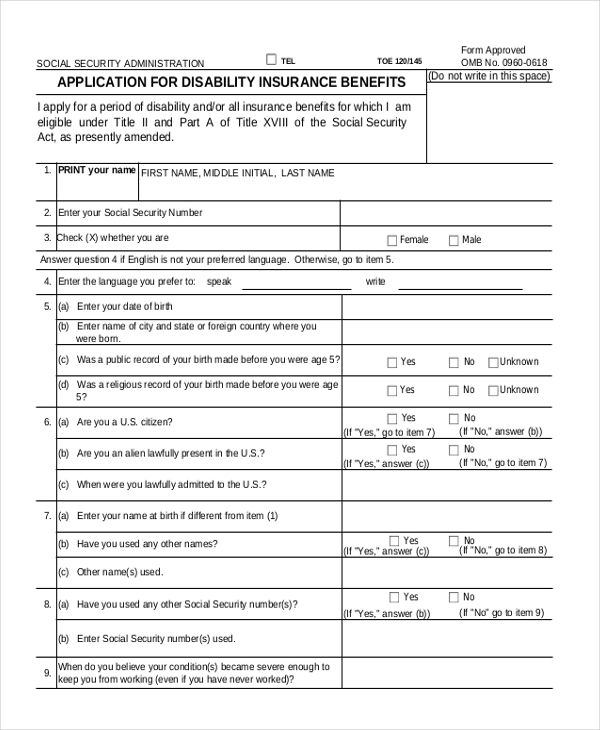Are you in need of valuable information and resources regarding disability applications? Look no further! In this article, we will provide you with a comprehensive guide on how to navigate the disability application process. Whether you are applying for Social Security Disability Insurance (SSDI) or Veterans Affairs (VA) disability benefits, we’ve got you covered.
Understanding the Disability Application Process
Before delving into the nitty-gritty details, it’s crucial to have a clear understanding of the disability application process. This process can be daunting and complex, but with the right information and guidance, you can confidently submit your application.
Why Apply for Disability Benefits?
Many individuals with disabilities face significant financial hardships due to their inability to work and earn a living. Disability benefits can serve as a lifeline, providing financial assistance to cover medical expenses, daily living costs, and other essential needs.
Eligibility Requirements for SSDI
To qualify for SSDI benefits, you must meet several eligibility requirements set by the Social Security Administration (SSA). These requirements include:
- Having a medical condition that meets the SSA’s definition of disability
- Having enough work credits earned through prior employment
- Meeting the SSA’s “duration of work” test
Eligibility Requirements for VA Disability Benefits
If you’re a veteran, you may be eligible for VA disability benefits. The eligibility criteria for VA benefits are different from those of SSDI. To qualify for VA disability benefits, you must:
- Have a disability that is connected to your military service
- Have received an honorable or general discharge from the military
- Meet the VA’s disability rating requirements
Where to Find Disability Application Forms?
Obtaining the necessary application forms is the first step in the disability application process. Here are some reliable sources where you can find printable disability application forms:
Social Security Administration Website
When applying for SSDI, you can visit the Social Security Administration’s official website to download and print the required forms. These forms are easily accessible and user-friendly.
 Image Source: SampleForms.com
Image Source: SampleForms.com
Veterans Affairs Website
If you’re a veteran applying for VA disability benefits, visit the official Veterans Affairs website. Here, you can find the necessary forms specifically tailored to veterans’ needs.
 Image Source: Contraposition Magazine
Image Source: Contraposition Magazine
Legal and Disability Advocacy Websites
Various legal and disability advocacy websites also offer printable disability application forms. These forms might come in different formats, so make sure to choose the one that best meets your needs.
Tips and Tricks for a Successful Application
Now that you have the necessary forms in hand, it’s time to dive into the application process. To increase your chances of a successful outcome, consider the following tips and tricks:
Seek Professional Assistance
If you’re feeling overwhelmed by the application process, don’t hesitate to seek professional assistance. Disability attorneys and advocates have the knowledge and experience to guide you through the process and help you avoid common pitfalls.
Provide Detailed Medical Documentation
One of the most crucial aspects of a successful disability application is providing detailed medical documentation that supports your claim. Be sure to include medical records, doctor’s notes, test results, and any other relevant information that showcases the severity of your condition.
Fill Out Forms Accurately and Thoroughly
When completing the application forms, accuracy and thoroughness are key. Double-check every piece of information you provide to ensure there are no errors or inconsistencies.
Include Personal Statements and Letters of Support
Personal statements and letters of support from friends, family, or healthcare providers can greatly strengthen your disability case. These statements should highlight the impact of your disability on your daily life and functioning.
Common Challenges and How to Overcome Them
While navigating the disability application process, you may encounter various challenges. Here are some common obstacles and strategies to overcome them:
Obstacle: Lengthy Processing Times
Due to high caseloads and limited resources, the processing times for disability applications can be lengthy. This can be frustrating for applicants in urgent need of financial assistance.
Strategy: Stay Persistent and Follow Up
Although it may require patience, staying persistent and following up on your application status can help expedite the process. Regularly contact the SSA or VA to inquire about the progress of your application.
Obstacle: Denial of Benefits
Receiving a denial letter can be disheartening, but not all hope is lost. Many disability applications are initially denied, often due to insufficient evidence or mistakes in the application.
Strategy: File an Appeal
If your application is denied, don’t give up. File an appeal within the designated timeframe and provide additional evidence to support your case. Consider seeking assistance from a disability attorney to navigate the appeals process more effectively.
Obstacle: Lack of Medical Documentation
Insufficient medical documentation can weaken your disability claim. This often occurs when applicants fail to regularly visit healthcare providers or communicate their symptoms effectively.
Strategy: Build a Strong Medical Case
To overcome this challenge, ensure you have regular medical appointments and maintain open communication with your healthcare providers. Be proactive in discussing your symptoms and seeking appropriate treatment. This will help build a strong medical case and improve the chances of a successful application.
Conclusion
Applying for disability benefits can be a complex and overwhelming process; however, with the right guidance and resources, you can navigate it successfully. Remember to gather all the necessary documentation, submit accurate and thorough forms, and seek professional assistance when needed. By overcoming common challenges and staying persistent, you increase your chances of obtaining the disability benefits you deserve.
Disclaimer: The information provided in this article is for educational purposes only. It does not constitute legal or professional advice. For personalized guidance on your disability application, consult with a qualified attorney or advocate.